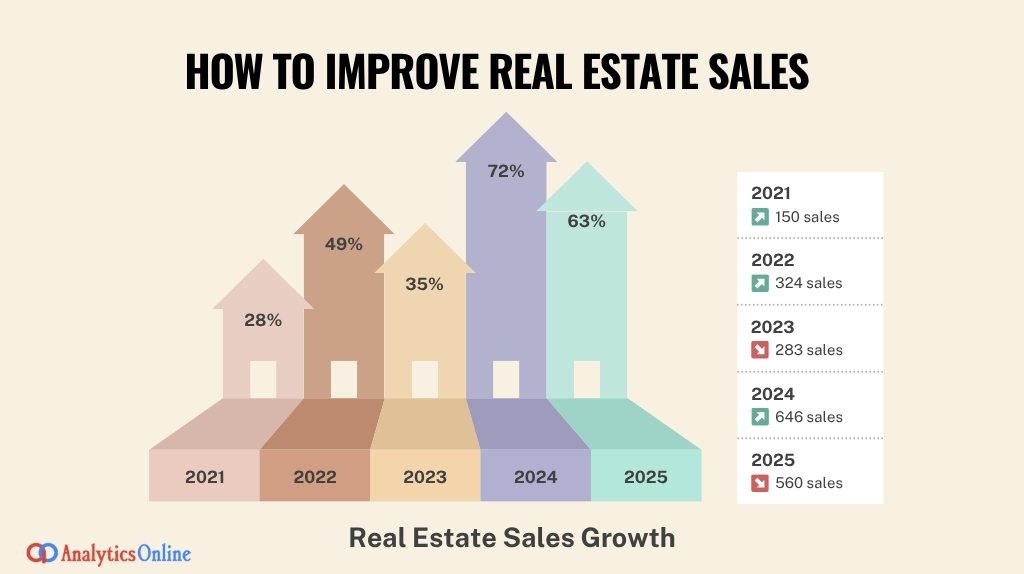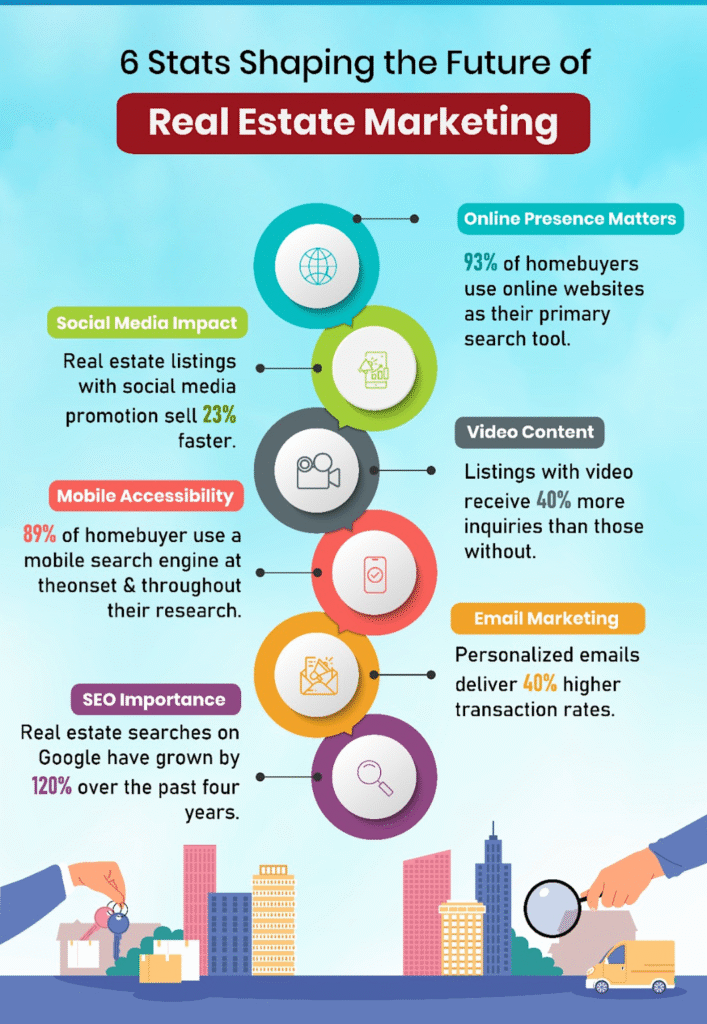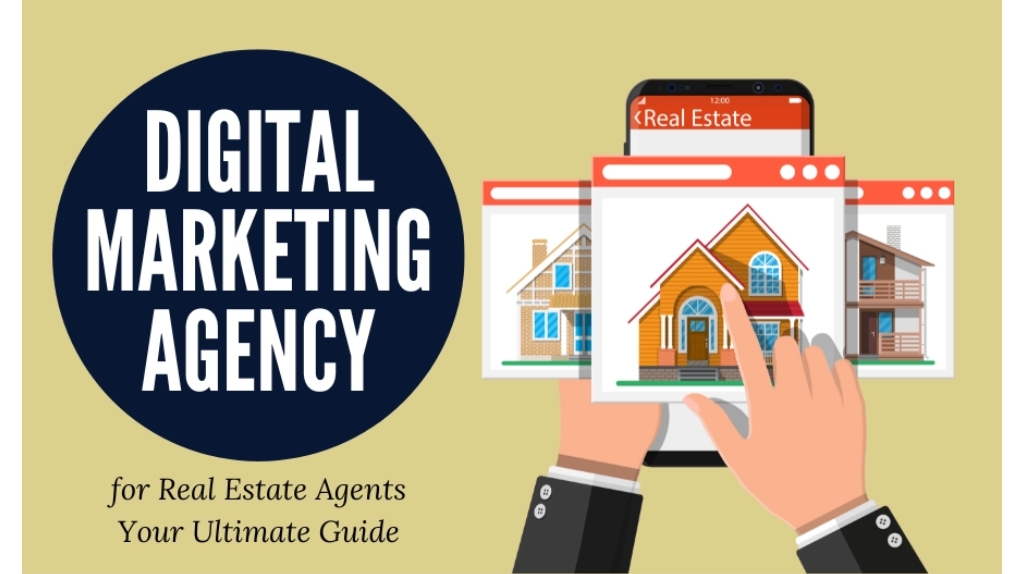
Real estate sales success in upcoming years depends largely on embracing modern digital marketing strategies. With 97% of home sales now beginning online, real estate professionals must adapt to digital-first approaches to remain competitive. This comprehensive guide explores proven techniques to boost your real estate sales through effective Real Estate Digital Marketing strategies.

Key statistics shaping the future of real estate digital marketing strategies to improve sales
Understanding Modern Real Estate Sales Challenges
The real estate industry has transformed dramatically over the past few years. Today’s buyers are more informed, tech-savvy, and expect seamless digital experiences throughout their property journey. Real estate professionals face increased competition, changing buyer behaviors, and the need to establish trust in a digital environment.
Modern challenges include:
- Rising customer acquisition costs
- Shortened attention spans requiring immediate engagement
- Need for 24/7 availability and instant responses
- Competition from tech-enabled platforms
- Demand for personalized experiences at scale
Digital Marketing Strategies for Real Estate Sales
1. Leverage Visual Content and Immersive Experiences
Visual content has become the cornerstone of successful real estate marketing. Properties with professional photography sell 32% faster and receive up to 1,200% more social media shares. Video listings boost inquiries by 403%, while 90% of buyers find video tours more compelling.
Key Visual Marketing Tactics:
- Professional Photography: High-quality listing photos influence 99% of buyers’ decisions to visit a property
- Virtual Tours: 52% of buyers prefer virtual tours over in-person visits, especially beneficial for out-of-state buyers
- Drone Footage: 61% of real estate agents use drones to capture aerial perspectives
- 3D Walkthroughs: Create immersive experiences that allow buyers to explore properties remotely

Digital marketing agency guide for real estate agents to boost sales using online listings
2. Optimize Your Online Presence with SEO
Search Engine Optimization ensures your properties appear when potential buyers search online. With local search being crucial for real estate, optimizing for location-based keywords significantly increases visibility.
SEO Best Practices for Real Estate:
- Target local keywords like “homes for sale in [city name]”
- Create location-specific landing pages
- Optimize Google Business Profile listings
- Generate regular content about local market trends
- Build quality backlinks from local businesses and organizations
3. Master Social Media Marketing
Social media platforms offer unprecedented opportunities to reach potential buyers where they spend most of their time. Facebook and Instagram are particularly effective for real estate marketing, with targeted advertising capabilities allowing precise audience targeting.
Effective Social Media Strategies:
- Share high-quality property photos and videos regularly
- Use Instagram Reels and Facebook Live for property showcases
- Create neighborhood highlight content
- Engage with local community groups
- Run targeted ad campaigns based on buyer demographics and interests

Real estate agent consulting clients over property documents in a professional setting
Lead Generation and Conversion Techniques
4. Implement Advanced Lead Generation Systems
Successful real estate sales require consistent lead flow. Digital tools enable automated lead capture and nurturing, ensuring no potential client falls through the cracks.
Proven Lead Generation Methods:
- Website Optimization: Add click-to-call buttons and live chat features
- Lead Magnets: Offer valuable resources like market reports or buying guides
- Email Marketing: Develop automated drip campaigns for lead nurturing
- Social Media Lead Ads: Use Facebook and Instagram lead generation campaigns
- Content Marketing: Create blogs, videos, and guides that attract organic traffic
5. Utilize CRM and Marketing Automation
Modern real estate success requires sophisticated customer relationship management. CRM systems help track leads, automate follow-ups, and ensure consistent communication throughout the sales process.
CRM Benefits for Real Estate:
- Centralized lead and contact management
- Automated follow-up sequences
- Task and appointment scheduling
- Performance tracking and analytics
- Integration with marketing campaigns

Handshake and house key symbolizing a successful real estate transaction
Sales Closing Techniques for Real Estate
6. Master Proven Closing Strategies
Converting leads into sales requires strategic closing techniques tailored to real estate transactions. Successful agents employ multiple closing methods depending on client behavior and situations.
Effective Closing Techniques:
- Assumptive Close: Proceed as if the client is ready to purchase
- Urgency Close: Leverage time-sensitive opportunities like multiple offers
- Summary Close: Highlight key benefits before requesting the sale
- Question Close: Ask questions that prompt buying decisions
- Direct Close: Straightforward approach asking for the sale
7. Build Trust Through Transparency and Communication
Trust remains fundamental in real estate transactions. Consistent communication, market expertise demonstration, and transparent processes build confidence in potential buyers.
Trust-Building Strategies:
- Provide regular market updates and insights
- Respond promptly to all inquiries
- Offer virtual consultations and property tours
- Share client testimonials and success stories
- Maintain professional online presence across all platforms
Technology Integration for Enhanced Sales Performance
8. Embrace PropTech Solutions
Property technology (PropTech) streamlines operations and enhances client experiences. AI-driven tools, blockchain contracts, and smart home integrations represent the future of real estate sales.
PropTech Applications:
- AI-powered property valuations
- Automated marketing campaigns
- Smart contract systems
- Virtual staging tools
- Predictive analytics for market trends
9. Mobile-First Marketing Approach
With increasing mobile usage for property searches, ensuring all marketing efforts are mobile-optimized is crucial. Mobile-responsive websites, social media content, and communication channels must provide seamless experiences.
Measuring and Optimizing Real Estate Marketing Performance
10. Track Key Performance Indicators
Successful real estate marketing requires continuous monitoring and optimization. Key metrics help identify what’s working and areas needing improvement.
Essential Metrics to Monitor:
- Website traffic and conversion rates
- Social media engagement and reach
- Lead generation quality and quantity
- Email open and click-through rates
- Cost per lead across different channels
- Time from lead to closing
Conclusion
Improving real estate sales in 2025 requires a comprehensive approach combining traditional relationship-building with cutting-edge digital marketing strategies. Success comes from creating compelling visual content, optimizing online presence, implementing systematic lead generation, and leveraging technology to enhance client experiences.
The most successful real estate professionals embrace Real Estate Digital Marketing as an essential component of their business strategy. By implementing these proven techniques – from SEO optimization and social media marketing to CRM automation and advanced closing techniques – you can significantly increase your sales performance and build a sustainable competitive advantage in today’s digital marketplace.
Remember, consistency in execution and continuous adaptation to emerging trends will determine long-term success in real estate sales. Start implementing these strategies today to see immediate improvements in your lead generation, client engagement, and closing rates.



